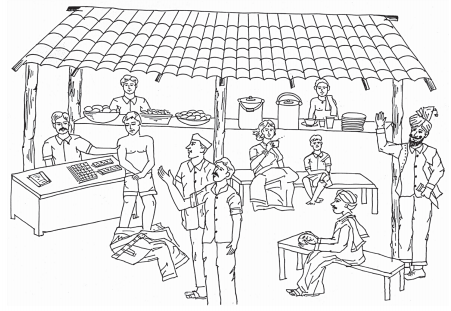Vaikom Muhammad Basheer’s short story “Oru Manushyan : Questions and Answers pdf” (One Man) is a powerful and moving story about the human condition. The story tells the tale of a poor and down-on-his-luck man who is struggling to survive in a big city. The man is faced with poverty, hunger, and exploitation, but he never gives up hope. Read More Plus One English Question and Answers.
Oru Manushyan Question and Answers

Question 1.
How did the restaurant owner treat the narrator?
OR
What was the reaction of the owner of the restaurant when the narrator was unable to pay the bill?
Answer:
There is no doubt that the restaurant owner treats the narrator mercilessly. He gives the narrator no chance at all. It is as if all those who claimed to have lost their purse were liars. Even when the narrator asks him to keep his coat, he shows no leniency. He has a lot of sadistic pleasure at the cost of the narrator while forcing him to strip. He comes out as a cruel man who has no pity at all for people with problems. However, there is the possibility that he has turned out to be so cruel after bitter experiences of being cheated by people who ate at the restaurant and pretended to have lost their purse.
If we consider the fact that the people of that place were ready to do anything for money, we should understand that the restaurant owner might have had people duping him with a cock-and-bull story of losing their purse. Maybe over the years, he has lost his gentleness and hence goes to the extreme extent of ill-treating such people so that others wouldn’t dare come up with lies.
All said and done, the final word on the restaurant owner is that he comes out as merciless. He could have made the narrator do some work in his restaurant to make up for the eleven annas. But, he gives absolutely no chance to the narrator and humiliates him cruelly.
Question 2.
What was the narrator’s profession? What kind of people lived in the city?
Answer:
The narrator was an English teacher by profession. He taught migrant labourers to write addresses in English from nine-thirty till eleven in the night. He lived in quite a big city in the valley of a mountain some thousand five hundred miles from home. The people of the city had never been known for the quality of mercy. They were cruel people who committed murder, robbery and picking pockets every day. But, by tradition, they were professional soldiers. Some of them lent out money on interest and many others served as watchmen in banks, mills and large commercial establishments in big cities.
Question 3.
How did the narrator lose his wallet? How did he finally pay the bill?
OR
Who had picked the narrator’s wallet? How was he saved by a stranger?
Answer:
One day, the narrator stepped out for his tea and a meal. He was dressed in a suit and he had a wallet in his coat pocket in which he had kept fourteen rupees. He went into a crowded restaurant and ate a full meal. The meal and tea cost him eleven annas. When he put his hand in his coat pocket to pay, there was no wallet in his coat pocket. When he told the restaurant owner that someone had picked his pocket and had taken away his wallet, the owner thought that he was telling lies. He threatened to gouge his eyes out if the bill was not paid. Then the narrator told the restaurant owner to keep his coat in the restaurant and that he would go out and bring some money.
The restaurant owner did not trust him and forced him to remove his coat, shirt and shoes off. Finally, he asked him to take off his trousers. The narrator told him that he had nothing underneath and expressed his reluctance to take off his trousers. But nobody in the restaurant believed him. As he had no other alternative, he began to undo the buttons of his trousers. At that moment a stranger announced that he would pay the money. He was a six-foot-tall, fair-complexioned man wearing a red turban and white trousers. He paid eleven annas to the restaurant owner and asked the narrator to follow him. Soon after reaching a deserted bridge, he took out five wallets from his pocket and asked the narrator to choose his from them. When the narrator pointed towards his wallet, the stranger asked him to open it. The narrator found his money intact and put it in his pocket. Thus the narrator realized that his wallet had been stolen by the stranger.
“Oru Manushyan” is a reminder that we should all be kind and compassionate to others. We should never judge others based on their circumstances. We should also always be willing to help those in need.
